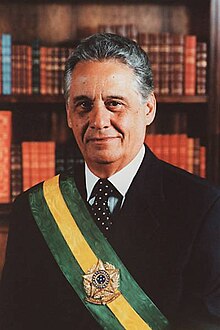Fernando Henrique Cardoso | |
|---|---|
 Official portrait, 1999 | |
| 34th President of Brazil | |
| In office 1 January 1995 – 1 January 2003 | |
| Vice President | Marco Maciel |
| Preceded by | Itamar Franco |
| Succeeded by | Luiz Inácio Lula da Silva |
| Minister of Finance | |
| In office 19 May 1993 – 30 March 1994 | |
| President | Itamar Franco |
| Preceded by | Eliseu Resende |
| Succeeded by | Rubens Ricupero |
| Minister of Foreign Affairs | |
| In office 2 October 1992 – 20 May 1993 | |
| President | Itamar Franco |
| Preceded by | Celso Lafer |
| Succeeded by | Celso Amorim |
| Senator for São Paulo | |
| In office 15 March 1983 – 5 October 1992 | |
| Preceded by | Franco Montoro |
| Succeeded by | Eva Alterman Blay |
| Chair of the Brazilian Centre of Analysis and Planning | |
| In office 1980–1983 | |
| Preceded by | Cândido Procópio Ferreira |
| Succeeded by | José Arthur Giannotti |
| Personal details | |
| Born | 18 June 1931 Rio de Janeiro, Federal District, Brazil |
| Political party | PSDB (1988–present) |
| Other political affiliations | PMDB (1980–1988) MDB (1974–1980) |
| Spouses | |
| Children | 3 |
| Relatives | Pedro Cardoso (cousin) |
| Residence(s) | São Paulo, São Paulo, Brazil |
| Alma mater | University of São Paulo (PhD) |
| Profession | Sociologist |
| Signature |  |
| Website | http://www.ifhc.org.br/ |
| This article is part of a series on |
| Liberalism in Brazil |
|---|
 |
Fernando Henrique Cardoso GCB GCTE GCoIISE GColIH GColL GCM RE DMN CYC OMRI (Brazilian Portuguese: [feʁˈnɐ̃du ẽˈʁiki kaʁˈdozu] ; born 18 June 1931), also known by his initials FHC (Brazilian Portuguese: [ˌɛfjaɡaˈse] ), is a Brazilian sociologist, professor, and politician[1] who served as the 34th president of Brazil from 1 January 1995 to 1 January 2003.[2] He was the first Brazilian president to be reelected for a subsequent term. An accomplished scholar of dependency theory noted for his research on slavery and political theory, Cardoso has earned many honors including the Prince of Asturias Award for International Cooperation (2000)[3] and the Kluge Prize from the US Library of Congress (2012).[4]
Cardoso was the 10th president of the International Sociological Association (1982–1986).[5]
- ^ Margolis, Mac (13 March 2006). "Che Guevara in Tweed". Newsweek.
- ^ "Galery of presidents" (in Portuguese). Palácio do Planalto. Retrieved 3 February 2016.
- ^ "Fernando Henrique Cardoso". Prince of Asturias Foundation. Archived from the original on 29 August 2008. Retrieved 11 November 2014.
- ^ Rohter, Larry (13 May 2012). "Fernando Henrique Cardoso of Brazil to Receive Kluge Prize". The New York Times. Retrieved 8 August 2017.
- ^ "ISA Presidents". International Sociological Association. Retrieved 25 July 2012.